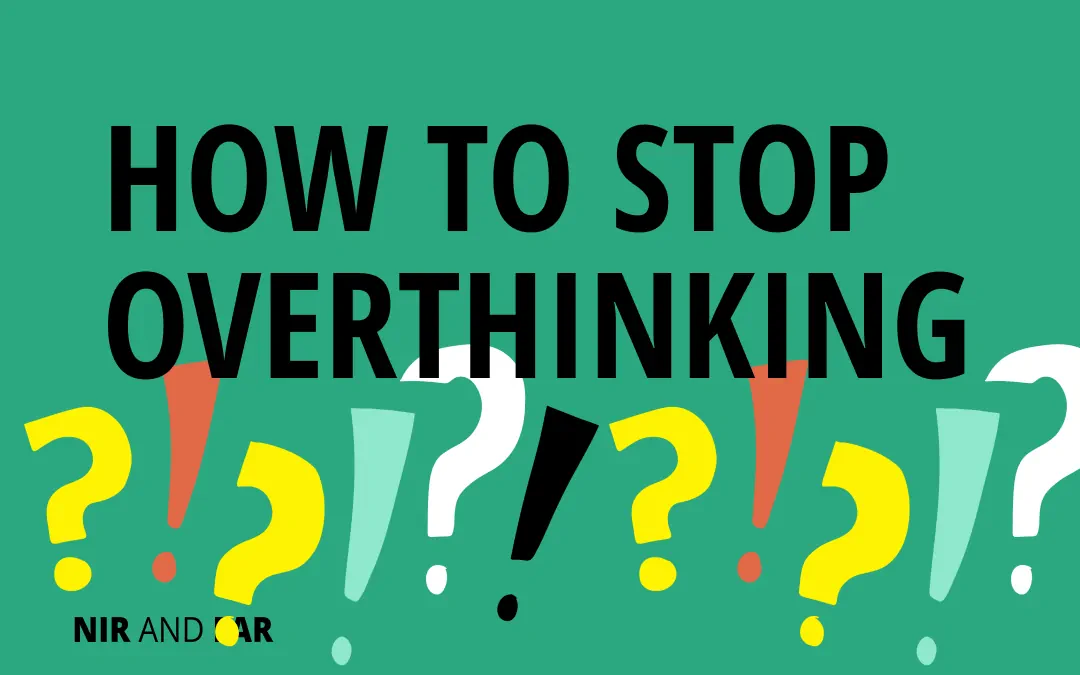Pull yourself out of a cycle of negative thoughts
We all dwell on unresolved personal conflicts from time to time. Who hasn’t ruminated on a hurtful comment or unintentional harm we might have caused someone? Feeling bad about something you did, or something done to you, is human. Congratulations on not being a psychopath!
But while it’s expected that the arguments we’ve had, the negative events we’ve experienced, and the major decisions we face haunt us, overthinking can also pile on new problems.
Rumination, or “overthinking,” is a hallmark of poor mental health and unhappiness. It is a psychological tendency that, if left unchecked, can reduce our enjoyment of life, ensuring we are never satisfied for long.
Yes, there are benefits to analyzing the past. But too much rumination can torment you and, worse, cloud your judgment about how to proceed into the future. The consequences of too much rumination are focusing on problems rather than solutions, sacrificing the present moment, and losing productive time, sleep, and healthy relationships.
Studies show there’s a way to circumvent rumination, which has myriad benefits, including helping us to overcome distraction in a world that has evolved faster than we have.
Free Schedule Maker Template
Take back control of your time and design your ideal day.
Your email address is safe. I don't do the spam thing. Unsubscribe anytime. Privacy Policy.


What Is Rumination?
Rumination is our tendency to keep thinking about bad experiences. It’s quite different from healthy self-reflection.
If you’ve ever chewed over something in your mind that you did, or that someone did to you, or over something that you don’t have but wanted, over and over again, seemingly unable to stop thinking about it, you’ve experienced what psychologists call rumination.
This “passive comparison of one’s current situation with some unachieved standard,” as described by the authors of a study on rumination, can manifest in self-critical thoughts such as, “Why can’t I handle things better?”
Another study notes, “By reflecting on what went wrong and how to rectify it, people may be able to discover sources of error or alternative strategies, ultimately leading to not repeating mistakes and possibly doing better in the future.” A potentially valuable trait—but, boy, can it make us miserable.
Rumination impairs decision-making and worsens physiological stress responses, and it’s correlated with not only leading to depression and anxiety but also increasing their severity. It can prompt us to distraction, and it’s one of four psychological factors that drive us to dissatisfaction.
Thankfully, some studies have found a way to rewire our rumination into wisdom.

Taking Yourself Out of the Equation
Have you ever tried talking about yourself in the third person? The practice, called illeism, goes at least as far back as the Ancient Greeks. (There’s still a lot we can learn from the Ancient Greeks.)
Several modern-day studies show that talking about yourself in the third person allows you to see past your personal biases and improve decision-making and emotional regulation.
How does it do that?
Illeism is a form of “self-distancing” that allows us to circumvent Solomon’s paradox: the idea that we are great at applying wise reasoning to others’ lives but terrible at applying it to our own. (Many studies validate Solomon’s paradox as social cognitive bias, though the psychological mechanism behind it remains unclear.) Distancing ourselves from our problems helps us to see them as clearly as we would another person’s.
That’s why illeism is a powerful method for breaking the cycle of rumination. It allows you to observe your thoughts and feelings objectively rather than getting caught up in an emotional storm. By referring to yourself as he, she, or they—or whatever third-person pronoun you prefer—you detach from the immediate experience and gain a broader perspective.
In this way, illeism is similar to talking to yourself as a friend would, another method for beating negative thoughts and self-talk.
Several studies—many conducted by psychologist Igor Grossmann at Canada’s University of Waterloo—have found that practicing illeism to defeat rumination makes us wiser.
According to Grossmann, wise reasoning includes intellectual humility, recognition of uncertainty and change, others’ perspectives and broader contexts, and compromise. He also found that wisdom is better than intelligence at predicting emotional well-being and relationship satisfaction.
Grossmann’s 2021 study shows that illeism can even help us build a long-term habit of being wise: For four weeks, almost 300 participants kept a daily diary describing a new social conflict or “irritating interaction.”
Half the group wrote in the third person, the other in the first person. Before and after the monthlong exercise, two psychologists scored each participant on wise reasoning.
The study found that those who wrote in the third person improved their “intellectual humility, open-mindedness about how situations could unfold, and consideration of and attempts to integrate diverse viewpoints.” According to Grossmann and his co-authors, “This project provides the first evidence that wisdom-related cognitive and affective processes can be trained in daily life.”

How to Use Illeism to Become Indistractable
To use illeism, a powerful cognitive-reframing tool, take a note from Grossmann’s study and journal in the third person about your conflicts. You might practice illeism during a daily 15-minute morning brain dump, which will not only reduce rumination and make you wiser but also alleviate the internal triggers, or negative feelings, that drive you to distraction. Conquering internal triggers is the first step in my four-step model to become Indistractable.
If you’re not the type to keep a diary, you can get those same benefits by visualizing your conflicts from a third-person perspective or relaying them to yourself in the third person, either aloud or in your head.
Think of a recent conflict with a romantic partner, a friend, or boss, or picture a significant life decision you’ve had to make. Describe that situation in the third person.
Here’s a one-sentence example if I were to try illeism: I’d replace “I was annoyed that they complained to me about distraction but hadn’t read Indistractable” with “Nir was annoyed that they complained to him about distraction but hadn’t read Indistractable.”
If you’re talking to yourself rather than writing, make it more realistic by addressing yourself in the mirror: Pretend you are a therapist or some other wise figure, and give advice to your reflection, the “client.”
Using illeism to combat rumination will do wonders for controlling your attention and boosting your focus, ultimately helping you to develop the most important skill of the future: being Indistractable.
Related Articles
- Schedule Maker: a Google Sheet to Plan Your Week
- Habit Tracker Template in Google Sheets
- The Ultimate Core Values List: Your Guide to Personal Growth
- Timeboxing: Why It Works and How to Get Started in 2025
- An Illustrated Guide to the 4 Types of Liars
- Hyperbolic Discounting: Why You Make Terrible Life Choices
- Happiness Hack: This One Ritual Made Me Much Happier

